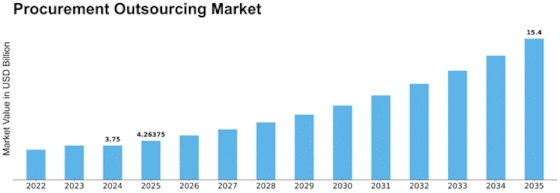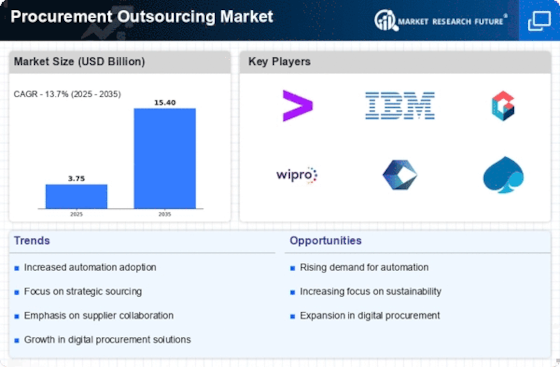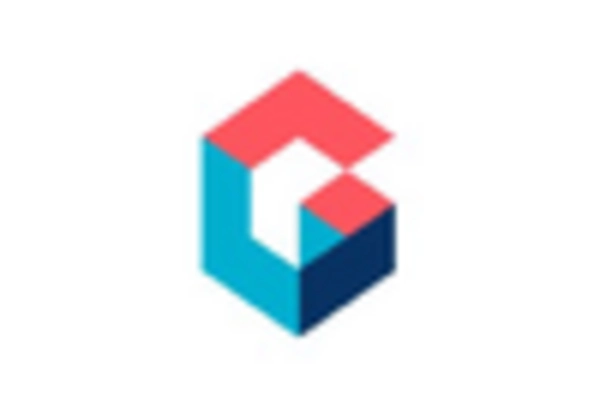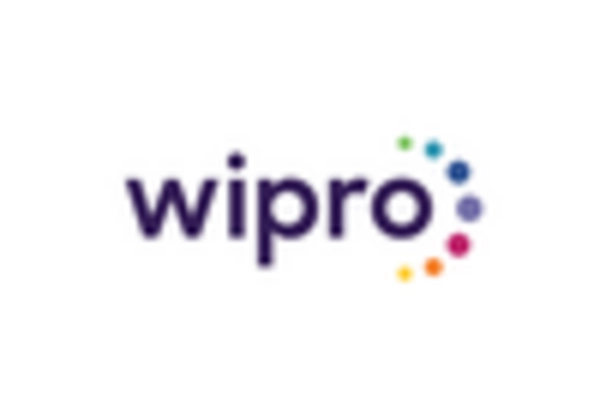Solution
Service
On-Premise
Cloud
Small and Medium-Sized Enterprises (SMES)
Large Enterprises
Banking Financial Services and Insurance (BFSI)
Healthcare
IT & Telecommunication
North America Procurement Outsourcing by Component SolutionSolution
Service
North America Procurement Outsourcing by DeploymentOn-Premise
Cloud
North America Procurement Outsourcing by Organization SizeSmall and Medium-Sized Enterprises (SMES)
Large Enterprises
North America Procurement Outsourcing by VerticalBanking Financial Services and Insurance (BFSI)
Healthcare
IT & Telecommunication
US Procurement Outsourcing by Component SolutionSolution
Service
US Procurement Outsourcing by Deployment
On-Premise
Cloud
US Procurement Outsourcing by Organization SizeSmall and Medium-Sized Enterprises (SMES)
Large Enterprises
US Procurement Outsourcing by VerticalBanking Financial Services and Insurance (BFSI)
Healthcare
IT & Telecommunication
CANADA Procurement Outsourcing by Component SolutionSolution
Service
CANADA Procurement Outsourcing by Deployment
On-Premise
Cloud
CANADA Procurement Outsourcing by Organization SizeSmall and Medium-Sized Enterprises (SMES)
Large Enterprises
CANADA Procurement Outsourcing by VerticalBanking Financial Services and Insurance (BFSI)
Healthcare
IT & Telecommunication
Europe Procurement Outsourcing by Component SolutionSolution
Service
Europe Procurement Outsourcing by DeploymentOn-Premise
Cloud
Europe Procurement Outsourcing by Organization SizeSmall and Medium-Sized Enterprises (SMES)
Large Enterprises
Europe Procurement Outsourcing by VerticalBanking Financial Services and Insurance (BFSI)
On-Premise
IT & Telecommunication
Germany Procurement Outsourcing by Component SolutionSolution
Service
Germany Procurement Outsourcing by DeploymentOn-Premise
Cloud
Germany Procurement Outsourcing by Organization SizeSmall and Medium-Sized Enterprises (SMES)
Large Enterprises
Germany Procurement Outsourcing by VerticalBanking Financial Services and Insurance (BFSI)
Healthcare
IT & Telecommunication
France Procurement Outsourcing by Component SolutionSolution
Service
France Procurement Outsourcing by Deployment
On-Premise
Cloud
France Procurement Outsourcing by Organization SizeSmall and Medium-Sized Enterprises (SMES)
Large Enterprises
France Procurement Outsourcing by VerticalBanking Financial Services and Insurance (BFSI)
Healthcare
IT & Telecommunication
UK Procurement Outsourcing by Component SolutionSolution
Service
UK Procurement Outsourcing by DeploymentOn-Premise
Cloud
UK Procurement Outsourcing by Organization SizeSmall and Medium-Sized Enterprises (SMES)
Large Enterprises
UK Procurement Outsourcing by VerticalBanking Financial Services and Insurance (BFSI)
Healthcare
IT & Telecommunication
ITALY Procurement Outsourcing by Component SolutionSolution
Service
ITALY Procurement Outsourcing by Deployment
On-Premise
Cloud
ITALY Procurement Outsourcing by Organization SizeSmall and Medium-Sized Enterprises (SMES)
Large Enterprises
ITALY Procurement Outsourcing by VerticalBanking Financial Services and Insurance (BFSI)
Healthcare
IT & Telecommunication
Spain Procurement Outsourcing by Component SolutionSolution
Service
Spain Procurement Outsourcing by DeploymentOn-Premise
Cloud
Spain Procurement Outsourcing by Organization SizeSmall and Medium-Sized Enterprises (SMES)
Large Enterprises
Spain Procurement Outsourcing by VerticalBanking Financial Services and Insurance (BFSI)
Healthcare
IT & Telecommunication
Rest Of Europe Procurement Outsourcing by Component SolutionSolution
Service
REST OF EUROPE Procurement Outsourcing by Deployment
On-Premise
Cloud
REST OF EUROPE Procurement Outsourcing by Organization SizeSmall and Medium-Sized Enterprises (SMES)
Large Enterprises
REST OF EUROPE Procurement Outsourcing by VerticalBanking Financial Services and Insurance (BFSI)
Healthcare
IT & Telecommunication
Asia-Pacific Procurement Outsourcing by Component SolutionSolution
Small and medium-sized enterprises (SMEs)
Asia-Pacific Procurement Outsourcing by Deployment
On-Premise
Cloud
Asia-Pacific Procurement Outsourcing by Organization SizeSmall and Medium-Sized Enterprises (SMES)
Large Enterprises
Asia-Pacific Procurement Outsourcing by VerticalBanking Financial Services and Insurance (BFSI)
On-Premise
IT & Telecommunication
China Procurement Outsourcing by Component SolutionSolution
Service
China Procurement Outsourcing by DeploymentOn-Premise
Cloud
China Procurement Outsourcing by Organization SizeSmall and Medium-Sized Enterprises (SMES)
Large Enterprises
China Procurement Outsourcing by VerticalBanking Financial Services and Insurance (BFSI)
Healthcare
IT & Telecommunication
Japan Procurement Outsourcing by Component SolutionSolution
Service
Japan Procurement Outsourcing by DeploymentOn-Premise
Cloud
Japan Procurement Outsourcing by Organization SizeSmall and Medium-Sized Enterprises (SMES)
Large Enterprises
Japan Procurement Outsourcing by VerticalBanking Financial Services and Insurance (BFSI)
Healthcare
IT & Telecommunication
India Procurement Outsourcing by Component SolutionSolution
Service
India Procurement Outsourcing by Deployment
On-Premise
Cloud
India Procurement Outsourcing by Organization SizeSmall and Medium-Sized Enterprises (SMES)
Large Enterprises
India Procurement Outsourcing by VerticalBanking Financial Services and Insurance (BFSI)
Healthcare
IT & Telecommunication
Australia Procurement Outsourcing by Component SolutionSolution
Service
Australia Procurement Outsourcing by Deployment
On-Premise
Cloud
Australia Procurement Outsourcing by Organization SizeSmall and Medium-Sized Enterprises (SMES)
Large Enterprises
Australia Procurement Outsourcing by VerticalBanking Financial Services and Insurance (BFSI)
Healthcare
IT & Telecommunication
Rest of Asia-Pacific Procurement Outsourcing by Component SolutionSolution
Service
Rest of Asia-Pacific Procurement Outsourcing by DeploymentOn-Premise
Cloud
Rest of Asia-Pacific Procurement Outsourcing by Organization SizeSmall and medium-sized enterprises (SMEs)
Large enterprises
Rest of Asia-Pacific Procurement Outsourcing by VerticalBanking Financial Services and Insurance (BFSI)
Healthcare
IT & Telecommunication
Rest of the World Procurement Outsourcing by Component SolutionSolution
Service
Rest of the World Procurement Outsourcing by Deployment
On-Premise
Cloud
Rest of the World Procurement Outsourcing by Organization SizeSmall and Medium-Sized Enterprises (SMES)
Large Enterprises
Rest of the World Procurement Outsourcing by VerticalBanking Financial Services and Insurance (BFSI)
Healthcare
IT & Telecommunication
Middle East Procurement Outsourcing by Component SolutionSolution
Service
Middle East Procurement Outsourcing by Deployment
On-Premise
Cloud
Middle East Procurement Outsourcing by Organization SizeSmall and Medium-Sized Enterprises (SMES)
Large Enterprises
Middle East Procurement Outsourcing by VerticalBanking Financial Services and Insurance (BFSI)
On-Premise
IT & Telecommunication
Africa Procurement Outsourcing by Component SolutionSolution
Service
Africa Procurement Outsourcing by Deployment
On-Premise
Cloud
Africa Procurement Outsourcing by Organization SizeSmall and Medium-Sized Enterprises (SMES)
Large Enterprises
Africa Procurement Outsourcing by VerticalBanking Financial Services and Insurance (BFSI)
Healthcare
IT & Telecommunication
Latin America Procurement Outsourcing by Component SolutionSolution
Service
Latin America Procurement Outsourcing by DeploymentOn-Premise
Cloud
Latin Procurement Outsourcing by Organization SizeSmall and Medium-Sized Enterprises (SMES)
Large Enterprises
Latin Procurement Outsourcing by VerticalBanking Financial Services and Insurance (BFSI)
Healthcare
IT & Telecommunication



















Leave a Comment